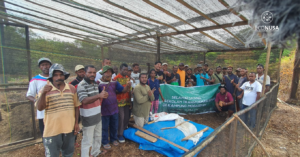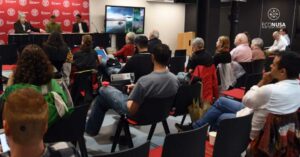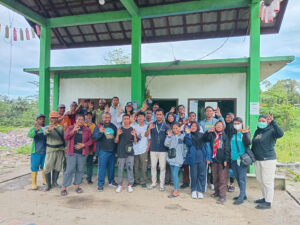
Walking through the port or small path to Arborek Village Hall in Raja Ampat, there was no signage on Covid-19 information. But on the village hall opposite the Eben Church, EcoNusa Covid-19 Response team was hailed by some villagers and local officials. The team paid a visit to Arborek to promote Covid-19 to homestay owners or managers, to organize health check and distribute nipa-made wall to the members of homestay association.
Prior to the pandemic, Arborek tourism village were flocked by tourists who just paid a visit or stayed at the islet homestays. Foreign tourists hustling along the small paths in Arborek used to be common view.
When the EcoNusa Covid-19 Response Raja Ampat was in Arborek, the village was idle without any activity. Consequently, only a few villagers dropped by the health check post. According to doctor Nanda, he only checked less than 20 patients. If was far less than the other visited villages with more than 30 patients so the team should restrict the number of patients.

However, in Arborek the health protocol for Covid-19 prevention has been fully implemented by all villagers. Despite the sluggish response to the health check post, the villagers remained their discipline in health protocol. Arborek dwellers did the physical distancing.
Read also: EcoNusa Covid-19 Response Responding Pandemic Impact in Raja Ampat
The team found that the villagers were fully aware of the Covid-19 pandemic when doing the Covid-19 campaign to owners or managers of homestay in the Raja Ampat Indigenous People and Livelihood Association (Perjampat). They could straightforwardly refuse tourists visits despite the fact that the local government was once instructed to open Raja Ampat tourism sites.
It is not too much to say that Arborek has been completely aware of Covid-19. Prior to the socialization from EcoNusa Covid-19 Response Expedition, they have applied health protocol independently.
Back to farming
According to Naftali Mambrako, the owner of Mawar homestay, Covid-19 has changed Arborek condition. Before pandemic, nearly all of their activities were dealing mainly with tourism. Moreover, food supply in the village depended on the tourists’ flow. When they would pick up guests, for instance, they would usually buy rice and vegetables in Sorong or Waisai. Since February, tourism could no longer be the main source of income. Mawar Homestay that used to be the main income for Naftali is now in sluggish condition.
“In such a condition, we are back to our former activities such as fishing and farming,” Naftali said while having a sigh.
They are farming at the nearby island. They plant kasbi (cassava), taro and vegetables. Arborek to the nearby island will take around 20 litres of gasoline to go back and forth by boat. For the reason, they build their own makeshift dwelling during their farming process.
“Arborek is a small and sandy island which could hardly be cultivated,” he said.
Meanwhile, Mama Regina Sauyai, a senior villager of Arborek, felt that the Covid-19 impact did not matter to her too much. Particularly when it concerns with the sluggish food distribution.
“I have accustomed to eat kasbi. I eat it with fish, and it is enough,” she said. She took a pity on young islanders. They are commonly eating rice and instant food and thus they would need money to eat.
As to Mama Regina, Arborek villagers could have live independently. The life of Arborek community has so far seemed to be dependent on Sorong and Waisai. But in fact, Arborek villagers now have been back to farming and fishing as they do currently.
Editor: Leo Wahyudi & V. Arnila Wulandani




